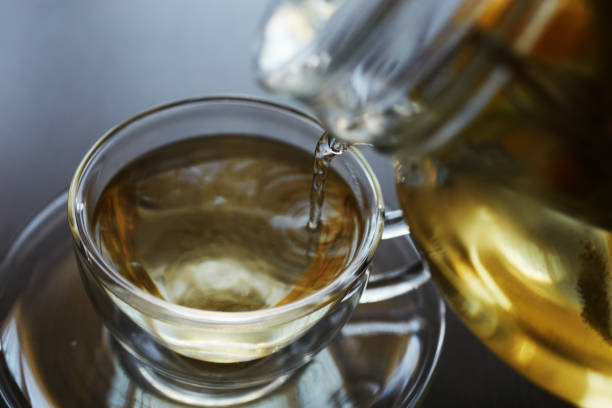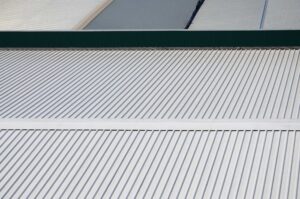
Healthy and relaxing hot drink with a mixture of linden, sage, lemon slice, green tea, thyme
Is green tea decaffeinated? Or does it have caffeine? Humans have been consuming green tea for centuries, and it is one of the most consumed teas. However, despite its countless health benefits, it may not be as beneficial for those with certain health issues. Why so? Isn’t green tea popular for its amazing benefits? Well, this tea, like the others, has caffeine… This is why some people may not be able to enjoy it as others do. But hey, I’ve got good news! If you are cutting down on caffeine (for health reasons), you can try decaffeinated green tea. Keep reading to learn what this type of tea is, how it benefits, and about the decaffeination process.
Is Decaffeinated Green Tea a Better Choice?
If you’re a tea lover who wants to enjoy the benefits of green tea without the caffeine unease, decaffeinated green tea might be just what you need. Decaffeination doesn’t mean that it completely removes caffeine from fresh green tea leaves; instead, it reduces it to trace amounts. The exact amount of caffeine removed depends on the method used during the process. As a result, you still receive a gentle energy lift from the minimal caffeine while enjoying the full health benefits of natural green tea leaves – something many others may miss out on.
Let’s walk you through the advantages of decaffeinated green tea:
- Antioxidant Properties
Decaffeinated green tea provides you with the essential antioxidants with minimal amount of caffeine intake. These oxidants not only protect body cells from oxidative damage but also help in reducing the risk of chronic illnesses like cancer.
- Better Sleep
In contrast to green tea, decaf could be used before bedtime, thus minimizing the risk of disturbed sleep cycle. It improves overall health and reduces the risk of potential mental and heart diseases.
- Improves Gut Health
You might have experienced acidity issues after having a cup of green tea. It is because of its acidic nature that causes acid reflux and affects your digestive system badly. In contrast, decaffeinated green tea helps improve your gut health while enjoying the benefits of green tea.
How Fresh Green Tea Leaves Are Decaffeinated?
There are various decaffeination methods that can be used, and each method has its pros and cons. Let’s walk you through all of them:
| Method | Process | Pros | Cons |
| Decaffeination by using Carbon Dioxide | This method uses carbon dioxide to extract caffeine from tea leaves. When CO2 is placed under high pressure, it has the ability to selectively dissolve and remove caffeine without affecting the flavor and antioxidants. | It’s one of the most effective and natural decaffeination methods, preserving the flavor and nutritional properties of the tea. | This method is costly and typically used by large-scale commercial producers. |
| Decaffeination through Swiss Water | In this method, tea leaves are soaked in hot water, which extracts both caffeine and other soluble compounds. The water is then passed through a carbon filter that absorbs and removes the caffeine. The remaining water, which contains the tea’s flavor compounds, is reintroduced to the leaves to absorb the flavor back. | It’s a chemical-free, natural process and is popular for organic green tea. | Some flavor and antioxidants may be lost during the process. |
| Decaffeination by using Ethyl acetate | In this method, Ethyl acetate is used to dissolve and remove caffeine from green tea leaves. The tea is soaked in a solution of ethyl acetate and water, which extracts the caffeine | This method is relatively inexpensive and preserves the flavors better than other methods | Although ethyl acetate is naturally derived, it can still have a slight impact on the flavor and aroma of the tea. |
Each decaffeination method has its pros and cons but with the CO2 and Swiss Water processes being the most natural and effective in preserving the flavor and health benefits of green tea. Methods involving solvents like ethyl acetate or methylene chloride are less expensive but can sometimes affect the flavor profile. Steam-based methods are gentle but may not be as effective on their own. If you are looking to try premium organic loose leaf green tea, check out our collection at Backyard Brew.
Why Not Opt For Traditional Green Tea?
Despite its countless health benefits, it’s important to note that it’s not recommended to use green tea in excess. The primary reason for this is the presence of caffeine in green tea leaves along with other beneficial compounds, which, when consumed in excess, affect both your mental & physical health.
| Negative Impacts | Description |
| Caffeine Dependency | Regular consumption of large amounts of green tea may lead to a caffeine dependency, causing withdrawal symptoms when intake is reduced. |
| Disrupted Sleep Cycle | Excessive caffeine intake, even in the form of green tea, can interfere with your sleep patterns, leading to insomnia or poor-quality sleep. |
| Increased Anxiety and Stress | High caffeine consumption can elevate stress levels, causing nervousness and anxiety. |
| Digestive Issues | Consuming too much green tea can irritate the stomach lining, potentially leading to acidity, acid reflux, or an upset stomach. |
| Dehydration | Green tea is a mild diuretic, which could increase urine output and potentially lead to dehydration if not balanced with adequate water intake. |
| Mental Fatigue | Overconsumption of caffeine can lead to mental fatigue, where the brain becomes overstimulated and finds it difficult to focus. |
Conclusion
While traditional green tea offers numerous health benefits, its caffeine content can pose serious health issues for those sensitive to stimulants or looking to reduce their intake. Decaffeinated green tea serves as the perfect balance as it retains the powerful antioxidants and wellness properties of green tea while minimizing the effects of caffeine. Whether you’re seeking better sleep, a peaceful mind, or enhanced focus, decaffeinated green tea allows you to sip smart without sacrificing your health. It’s the ideal choice for mindful tea drinkers who want all the benefits with none of the buzz.







